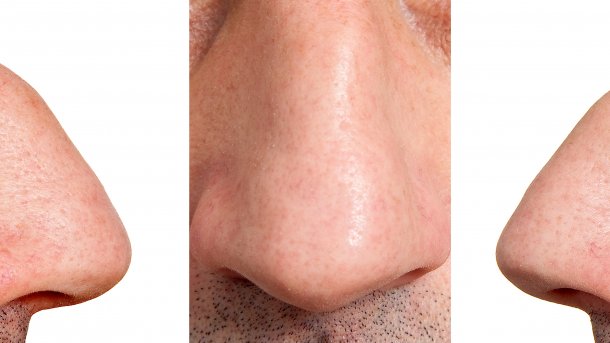People without a sense of smell breathe differently
In the course of the corona pandemic, loss of smell also occurred more frequently. An Israeli study now suggests that this also has an impact on breathing.

Three noses: Air – and smell.
(Image: Daniela Pelazza/Shutterstock.com)
One of the unpleasant effects of an infection with COVID-19 for some of those affected was that they lost their sense of smell and taste. Although this often returned once the disease had been cured, it sometimes disappeared completely. The suffering of these people during the pandemic led researchers to consider developing so-called olfactory implants. An electronic sensor recognizes odours, encodes them into an electrical output and transmits this to a transmitter, which in turn transmits it to an implant on the olfactory cells. Finally, electrical stimuli are triggered there to stimulate olfactory sensations. However, it has now been shown that a lack of sense of smell and taste not only leads to a reduced quality of life. It also has an impact on other physiological processes, as an Israeli research group has now shown. Without the ability to smell, the way we breathe also changes, which in turn can have further negative consequences for our health.
Sniffing while breathing is no longer necessary
The paper published in Nature Communications by Lior Gorodisky, Noam Sobel and colleagues at the Weizmann Institute of Science examined a group of 52 test subjects. Of these, 21 could smell normally and 31 could not (any longer) – they suffered from anosmia, a permanent or temporary loss of the sense of smell. During a 24-hour period, all participants wore a device that monitored the air flow through the nose. All subjects breathed approximately the same amount. However, those who could smell showed additional peaks within each breath as more air flowed into the nose. This happened about 240 times per hour. Interestingly, these breathing peaks did not occur when the smelling subjects were in a completely odorless room. Apparently, the peaks have to do with the sense of smell. Those who could not smell omitted this and had overall shifts in their breathing pattern, regardless of whether they were asleep or awake.
Videos by heise
The lack of sniffing during breathing does not appear to be dangerous for the body. It does not result in a reduced oxygen supply. However, it does have negative effects on well-being and possibly mental health. It is known that people without a sense of smell are more likely to suffer from depression, loneliness and emotional deprivation (or slower emotional reactions). There is also a greater risk of anxiety disorders. Those who suffer from anosmia, at least according to some studies, could also have a lower life expectancy – probably also due to the aforementioned psychological effects. Interestingly, it was also possible to determine whether a person has a sense of smell or not from their breathing pattern with a decent accuracy of 83 percent – No odor samples are required for this. This could help with diagnostics, as we would no longer have to rely solely on the patient's own statements.
Breathing airflow as an indicator of health
In addition, the way we breathe also has an influence on our emotional world. "The patterns of respiratory airflow have a strong influence on health, emotions and cognition. We therefore suggest that some of the harmful consequences associated with anosmia are due to altered patterns of respiratory airflow through the nose rather than a direct consequence of loss of olfactory perception per se," write Gorodisky, Sobel & Co. This makes it all the more important to help those affected to restore their sense of smell.
"There is a general perception that the sense of smell is an 'unimportant' human sensory organ," say the researchers. But this is not the case. For those affected, this is – very painful in a figurative sense –. However, the number of people affected is poorly researched: it varies between 1.4 and up to 15 percent of the population in Western countries. Up to 24 percent of people over 53 years of age are affected. New patients in particular have recently been added due to COVID-19.
(emw)